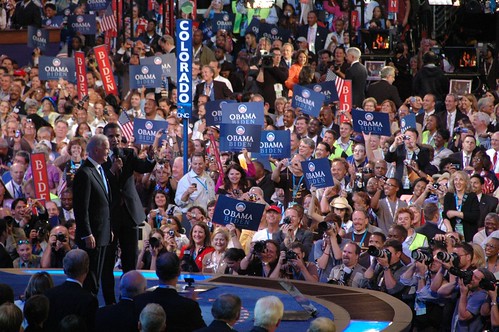Senator Joe Biden set the stage last week for a renewed US focus on Pakistan and Afghanistan if Barack Obama makes it to the White House this fall. The vice presidential nominee, in his acceptance speech at Denver’s Pepsi Center on August 27, called the, “resurgence of fundamentalism,” in Afghanistan and Pakistan, “the real central front against terrorism.” He mentioned Pakistan – which Washington considers a crucial ally in the “war against terror” – three times, and gave broad indications that US policy for that region could undergo some fundamental changes under an Obama administration.
Barack Obama and Joe Biden at the Democratic National Convention. Photo by Ka Chan
“I’ve been on the ground in Georgia, Iraq, Pakistan and Afghanistan, and I can tell you in no uncertain terms: this administration’s policy has been an abject failure. America cannot afford four more years of this,” the six-term Delaware Senator said. The Bush Administration has often been criticized by the media and leading Democrats, Biden included, for its Musharraf-centric policy for eight years during which Pakistan received more than $10-billion in US aid.
Biden called the Bush Administration’s foreign policy “catastrophic” and chided McCain’s vision as a continuation of Bush policies. He mentioned a troop surge as a necessary step to defeat the resurgent Taliban and Al-Qaeda. “The fact is, Al-Qaida and the Taliban—the people who actually attacked us on 9/11—have regrouped in those mountains between Afghanistan and Pakistan and are plotting new attacks. And the Chairman of the Joint Chiefs of Staff echoed Barack’s call for more troops.”
Obama too, in his acceptance speech a day later, identified two key foreign policy objectives: “I will end this war in Iraq responsibly, and finish the fight against al Qaeda and the Taliban in Afghanistan.” The Biden-Obama strategy is expected to include a US troop surge in Afghanistan and renewed pressure on Pakistan.
The future administration in Washington will have to deal with old realities and new players in Pakistan. The nation of 167 million people is mired in abject poverty, increasing lawlessness, insurgency and political turmoil after the recent resignation of President Pervez Musharraf. The United States will have to build Pakistan’s capacity to stave off political, institutional and economic meltdown by offering greater military and economic aid and supporting democratic forces, without taking sides in Pakistan’s internal politics.
Though the Bush Administration has been adjusting to the changed ground realities in Islamabad, it is still too early to say much about the extent of cooperation the US will receive from Islamabad’s new rulers in the war against terror.
With former prime minister Nawaz Sharif’s Pakistan Muslim League party sitting on the opposition benches and public sensitivity to US policy toward the region at its peak, Pakistan’s government will find it hard to sell the war on terror to the nation’s legislature. Already, many Pakistanis are upset by Barack Obama’s promise of unilateral strikes on Pakistani territory to root out terrorists – a position he has changed in recent weeks. Now Obama promises to honor Pakistan’s sovereignty, but suspicions among Pakistanis are so deep that many still believe the Illinois Senator might simply be playing to the voters’ ahead of the November election.
Musharraf’s exit thus could be a setback for US war efforts in the region. However, the change in Pakistani leadership also offers a rare opportunity. Washington can rebuild its relations with Islamabad, as has been proposed by Joe Biden repeatedly, by investing more in the people of Pakistan, in the economy, in the social infrastructure and in democratic institutions.
Jehangir Khattak is a US-based Pakistani journalist, and can be reached at mjehangir@aol.com


